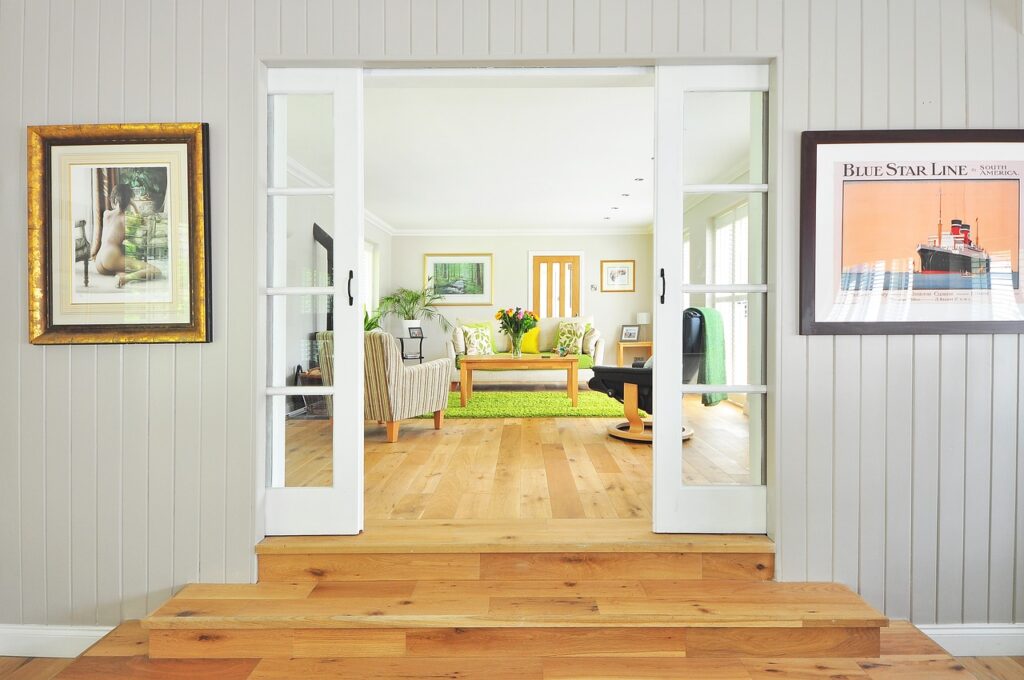A Newly Engaged Couple’s Guide to Buying a First Home Together
first home tips for newly engaged couples, buying a home together before marriage, home-buying guide for engaged couples
November 8, 2024
Newly engaged couples – home-buying guide

Table of Contents
ToggleIntroduction: A Shared Dream
Now that you’re planning your future together, you might also be thinking about buying a home. Owning a home brings both excitement and responsibility. This guide will help you understand each step of the process so you can confidently navigate this new journey together. Please read on to find out more about the newly engaged couple’s guide to home-buying.
Looking for your Wedding Venue? Discover Palafox Wharf Waterfront Wedding Venue which is nationally recognized as one of the best Florida wedding venues for its waterfront scenic views and premium Pensacola wedding venue, situated on the water in the heart of one of “America’s Great Places” on South Palafox Street. Capacity is up to 150 seated and 175 strolling. You and your loved ones will enjoy the luxury of being able to walk to and from your wedding venue to your hotel, restaurants, coffee shops, downtown entertainment, and nightlife.

1. Evaluate Your Current Financial Situation – Home Buying Tips for Newly Engaged Couples

Before diving into the home-buying process, it’s essential to evaluate your finances together. Start by listing all sources of income, outstanding debts, and current savings. Discuss financial habits and goals openly, as transparency about finances is crucial to making informed decisions as a couple.
Why it matters:
Knowing your financial foundation helps set realistic expectations and creates a foundation of trust. Discussing finances early on is also a great way to prevent misunderstandings in the future.
2. Creating a Joint Budget for Homeownership

Once you’ve assessed your finances, decide on a comfortable budget for a home. A general guideline is to keep your monthly mortgage payments under 30% of your combined gross income. Don’t forget to account for other costs, such as property taxes, insurance, utilities, and maintenance.
Why it matters:
Setting a budget helps prevent overspending and financial strain. It’s easy to get swept up in the excitement of house hunting, but sticking to a budget ensures you’re making a wise, long-term decision.
3. Discuss Your Ideal Location – First Home Guide for Engaged Couples

Take some time to think about where you want to live. Think about how close you are to work, family, and things that affect your daily life, such parks, stores, and community events. No matter where you want to live, whether it’s in a busy metropolis, a quiet suburb, or a peaceful coastal area, it’s crucial to find a location that fits your needs and your likes.
Why it matters:
Where you live influences not only your daily life but also the quality of your life as a whole. You and your partner will both feel at home and pleased in your new house if you choose a neighborhood that fits both of your lifestyles.
4. Explore Loan Options Together

Understanding mortgage options is critical, especially if you or both of you are first-time buyers. Conventional loans, FHA loans, VA loans, and USDA loans each offer different terms and advantages. Researching your options together will help you choose a loan that fits your financial situation and future plans.
Why it matters:
Choosing the right mortgage means you’ll be able to afford your home without overextending yourselves. The right loan sets the stage for stable, stress-free homeownership.
5. Get Pre-Approved for a Mortgage – Buying a House Before Marriage Checklist

Getting pre-approved for a mortgage will help you figure out how much you can afford. It also helps you look more appealing to vendors because it shows you’re a serious buyer. You will need to send in financial documents for pre-approval, so be ready to work with us to get these ready.
Why it matters:
You can save time and avoid disappointment by only looking at properties that are within your budget once you have a pre-approval.
6. Defining Your Must-Haves and Nice-to-Haves is an Important Aspect of the Newly engaged couple home-buying guide

It’s a good idea to write down the things you really need in a home, like how many bedrooms it has, and the things that are nice to have, like a big yard or a fireplace. It will be easier to find properties that meet both of your demands if you separate the features into “must-haves” and “nice-to-haves.”
Why it matters:
Setting priorities will help you find what you’re looking for quickly and make sure you’re happy with your choices. When you know what matters most, you’re less likely to feel stressed or confused while you’re doing it.
7. Partnering with a Knowledgeable Real Estate Agent – How Engaged Couples Can Buy a Home Together

It might make a big difference to deal with a real estate agent who has helped first-time homebuyers before. They can help you understand market trends, evaluate homes, and negotiate. Pick someone who knows what you want, how much you can spend, and where you want to live.
Why it matters:
An agent makes buying a property easier, simpler, and less stressful. They’ll also help you prevent problems, which will provide you with peace of mind.
8. Think About a Starter Home as an Option

Instead of buying a lifelong home right away, many newly engaged couples start with a smaller “starter home.” This might be a smaller or less expensive home that lets you develop equity and save money for future improvements.
Why it matters:
For first-time buyers, a starter home is typically a good financial choice. You can strive toward your ideal home without going over your budget by slowly building equity.
9. Plan for Potential Resale Value

Life can change, even if you plan to stay in your house for a long time. Put characteristics and locations that tend to keep their value at the top of your list, including homes in good school districts or close to public transportation.
Why it matters:
If you ever decide to move, planning with resale value in mind will help protect your investment and make it easier to sell.
10. Budget for Home Insurance

Home insurance protects your home from theft, natural catastrophes, and other things that could happen that you didn’t foresee. Look at different insurance companies to locate one that fits your demands and your budget. Depending on where you live, you might also want to consider getting extra coverage, such as flood insurance.
Why it matters:
Insurance gives you peace of mind and makes sure you have the help you need to get better if something goes wrong.
11. Prepare for Maintenance Costs and Upkeep

As a homeowner, it will be your job to take care of the property. Lawn care, heating, plumbing, and routine repairs are all things that people often have to pay for. Even if your property is brand new, you should set aside some money in your budget for these continuing needs.
Why it matters:
Putting money aside for repairs will maintain your home in fantastic shape and stop tiny problems from becoming big ones that cost a lot of money.
12. Look into First-Time Homebuyer Programs

Many states have programs to help people buy their first home, such as lower interest rates, aid with the down payment, and tax breaks. Look into the help alternatives in your area to see if you can get any.
Why it matters:
Programs for first-time homebuyers can help you afford a home, which is the first step toward reaching your goal.
13. Enjoy the Process and Make it Fun

House hunting can be challenging, but it’s also an exciting milestone. Celebrate small wins along the way, whether it’s finding a home within budget or completing your first tour. Consider taking breaks or planning date nights to keep the journey lighthearted and enjoyable.
Why it matters:
You will strengthen your relationship if you remain happy all the time. It’s unique because both of you worked on it.
Conclusion of Newly engaged couple home-buying guide:

Purchasing your first home together is a big deal. With planning, open communication, and the right guidance, you can navigate the journey successfully and lay the foundation for your future. Enjoy each step, embrace the experience, and look forward to creating your first home as a newly engaged couple!
Resources for Newly Engaged Couples’ Home-Buying
- Federal Housing Administration (FHA) – Search for their official website for information on FHA loans and first-time homebuyer programs.
- U.S. Department of Housing and Urban Development (HUD) – This site provides a wide range of homebuying resources.
- URL: Visit hud.gov and navigate to the “Buying a Home” section.
- Fannie Mae – Look for resources on mortgage loans and homeownership assistance.
- URL: Visit fanniemae.com for first-time homebuyer information. URL: Visit fanniemae.com
- Freddie Mac – Provides educational resources on understanding different loan types and mortgage options.
- URL: Check freddiemac.com for homeownership guidance.
- Consumer Financial Protection Bureau (CFPB) – Offers a variety of guides related to mortgages and financial planning.
- URL: Go to consumerfinance.gov for tools and resources on buying a home and understanding loans.
- Local State Housing Authorities – Your state’s housing authority may have specific programs for first-time homebuyers and financial assistance.
Ready to Take the Next Step after Reading Newly engaged couple – home-buying guide ?

After looking at A Newly Engaged Couple’s Guide to Home-Buying Together, are you ready to go to the next step?
Ready to plan a wedding full of love and personal tributes? Schedule your phone consultation today with Sandy at Palafox Wharf Waterfront
and let us help create a day that honors both your future together and the loved ones who will always hold a special place in your heart.
(850-748-5102)
Schedule a phone consultation today to see how we can help create your dream wedding at Palafox Wharf Waterfront!
Did You Enjoy Reading A Newly Engaged Couple’s Guide to Buying a First Home Together? You might also enjoy –
Thank You for Stopping by our Blog titled A Newly Engaged Couple’s Guide to Buying a First Home Together!
For all your friends and family that are in other areas of the nation, we hope that you will consider referring to the below venues. These venues are locally owned wedding venues for their big celebration. Locally owned wedding venues provide the best wedding experience. They tend to have little to no turnover, they support the local economy and they are part of the community. Choosing a locally-owned wedding venue means the world to our small family-owned wedding venues. In an effort to support locally-owned wedding venues, we will feature 10 small business wedding venues. These are throughout the United States in each of our blogs. Find locally owned wedding venues in the wedding venue map on WeddingVenueOwners.com.
The Glade Venue
The Barn at Poplar Springs Farm
